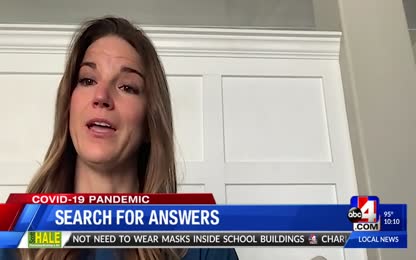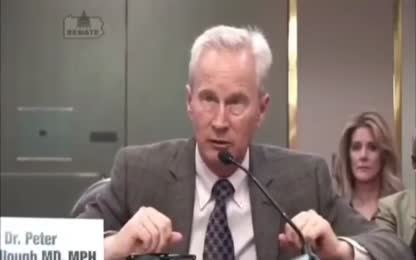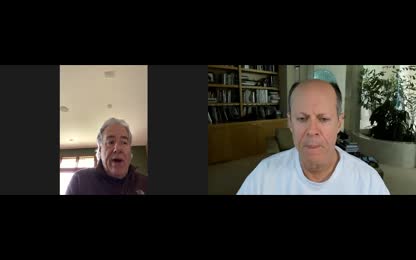Advertisement
How Charities Betray Patients
How Charities Betray Patients
Vernon Coleman
International best-selling author, Dr Vernon Coleman MB ChB DSc FRSA, explains how many charities, as they get bigger, lose touch with the needs of patients and become marketing departments for big companies.
For more unbiased information about other important issues, please visit http://www.vernoncoleman.com The transcripts of the videos (including the ones that YouTube banned) are also on my website.
Thank you for all your support and encouragement.
Please subscribe and please share.
- Category: Pandemic/PlanDemic/ScamDemic,Charity ,Scam / Fraud / Bluff / Swindle
- Duration: 09:13
- Date: 2020-06-30 01:01:03
- Tags: no-tag
0 Comments
Video Transcript:
I have long been a supporter of patient associations. Small groups set up to defend and protect the interests of patients with specific health problems. The associations provide support and information for patients and also campaign on their behalf. Back in the late 1960s and the early 1970s, I compiled the first directory of patients associations. In those days, most such groups were small and run by volunteers, usually from someone's kitchen table. Money was raised by organising coffee mornings and selling raffle tickets, cash which couldn't be raised this way came from the wallets and handbags of volunteer organisers. Private telephones were used and newsletters were put together with a cheap copier machine and a stapler. Most of these small organisations were run on a hand-to-mouth basis. And then the drug companies realised that these associations could be useful to them in a number of ways. To begin with, they realised that the associations gave them a way of contacting their customers directly, without going through prescribing doctors. And later, as the volunteers started to do local newspaper interviews to raise a well-niss-awareness of the illness with which they were concerned, and the association they'd formed, the drug companies realised that they'd discovered an excellent way to influence public opinion. Occasionally, there would be a chance for national publicity on radio or television or in a newspaper or magazine looking for a human interest story. The patient's organisation would provide patients and relatives prepared to talk about their disease through a wider public. Newly formed local radio stations and local TV stations had an insatiable demand for people to talk about diseases. And the volunteers whose created patients associations found themselves in a powerful position. Now, the laws in most countries mean that drug companies are not allowed to advertise prescription-only products directly to patients. Advertisments can only be aimed at the doctors prescribing the drugs. This is why so many medical journals make so much money. Advertising rates are massively higher than for ordinary consumer magazines. Slowly, the drug companies which produced the pharmaceutical products these patients were taking realised that the patients associations offered them a way to communicate directly with lots of patients. Through the patients associations, they could promote new products. They could explain why their product was better than anyone else's. And they could influence the public's understanding of the disease concerned. For important, most important of all, they could use the patients associations to control and denigrate the drug industry's own critics, whether the critics were alternative health practitioners or rogue doctors, drawing attention to side effects and other problems. And so the drug companies started to approach the volunteers running small charities and to offer them financial help. It probably all seemed innocent and well-meaning, a dozen volunteers producing a newsletter for sufferers of a disease. Let's call it Godwin's disease because I know of no such disease. Would be approached by a company. Let's call it Islington International Pharmaceuticals because I know of no such company, which happened to be the manufacturer of a drug used in the treatment of Godwin's disease. And the drug company would kindly offer to help. We all want to help patients, the drug company would say, you're doing terrific work and we are a kindly philanthropic organisation. So please allow us to give you 500 pounds to help pay for printing and posting your newsletters. I'm talking, remember, about the 1970s. The surprised volunteers would be enormously grateful. They would enthusiastically accept the 500 pounds and it would make life a little easier. Then a few weeks or months later when the 500 pounds had gone, the drug company would come back and offer a larger sum. We think we can help more, they would say. We would like to make a donation of 5,000 pounds. In return, we'd be pleased if you'd put our logo onto your newsletter and your leaflets. This will enable us to tell the Board of Directors that our donation is advertising and therefore justified. The volunteers would innocently and happily accept the 5,000 pounds and they would be hooked. Before long, the villa volunteers would be working out of smart offices in the nearest town. Two or three of them would be paying themselves salaries, pension payments and expenses and the drug company money would be essential and expected. The small charity would not be able to exist in its new form without the big checks from the drug company. The days of putting together a newsletter on the kitchen table would be forgotten. Sadly, the days of honesty and integrity would also be gone. The charity, for by now the volunteers would have doubtless been able to afford to register their association as a proper charity, would no longer rely on those little coffee mornings and those efforts to sell, raffle tickets for a bottle of cheap wine. This now happens all the time. The sums involved can be quite large and once the charity is hooked, then the game is over. The drug company owns the charity and has a valuable mouthpiece. One or two people are criticising our best-selling product. The drug company might say to one of the charity's employees, this is unreasonable and unfair and we know that support from you would help counteract the criticism. What can we do to help would be the response from the charity. Our publicity people has contacted a few television and radio folk and they'd love to talk to you about appearing on their programmes. They will of course pay you a fee and provide you with a hotel and your expenses. And so the charity employee would go on television and radio and enjoy the fame and a little bit of money and they'd usually say what ever it was that the drug company wanted them to say. Why not? We're all working together, they'd think. Many of the big charities now have very well paid executives and of course as they get bigger there's a risk that charities become corporate. They end up with huge administrative staffs. They pay their executives six figure salaries with massive expense accounts and pensions. I know of well-known charities which spend less than a quarter of their income on the cause for which they are supposed to exist. Most of their income goes on salaries and administration. They longer go lost sight of the aims which kept them sat around the kitchen table. Actually those people have long since gone pushed aside by the professionals. And some of these highly paid charity executives know damn well that they'd have a job finding similarly well-paid employment outside the charity sector. So the charities employees find that their aims are aligned with those of the sponsoring drug companies and they certainly don't have an incentive to see anyone find a cure for their disease. Once a cure has been found there'll be no need for a campaigning charity and the drug companies profits will collapse. I fear that too many charities sometimes get too close to drug companies but as a result I think the patients suffer. Indeed I'd go so far as to suggest that some charities, particularly large ones, do more harm than good, having become little more than marketing departments for one or two big drug companies. If you want to help by giving money to charity I suggest that you give to small local charities, preferably ones that don't have paid staff or push offices. Thank you for watching an old man in a chair and thank you for all your support and encouragement. Please copy and share the videos on Twitter and Facebook, BitShoot and wherever else. Let's spread the truth. If you'd like to put on a translation that would be great. If my videos disappear then please go to my website to find out where you can see them. The transcripts of all my videos including the bandwands are always on my website www.vernancolman.com. If you do visit mainstream media please put on a note at the end in the comments section asking people to take a look at the videos to find a bit of truth outside the mainstream media. This channel has not been monetized, I haven't authorized any advertising and there's no sponsorship. My only earnings are those through sales of my books. If you'd like to see more videos from me then please subscribe to my channel because the videos are not always easy to find. Remember to stress the government, avoid mass media and fight the lies. Thank you for watching.









 Donate
Donate







